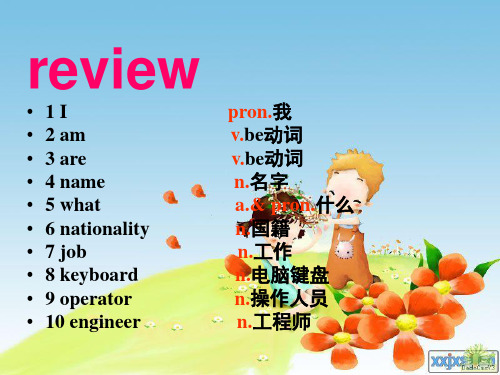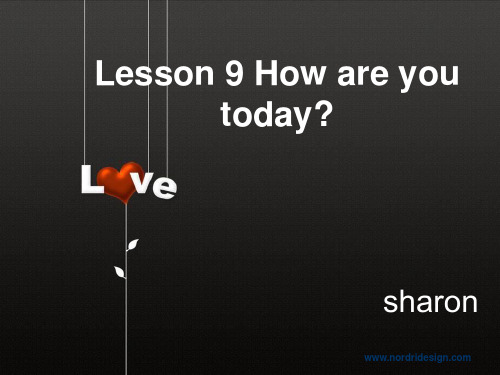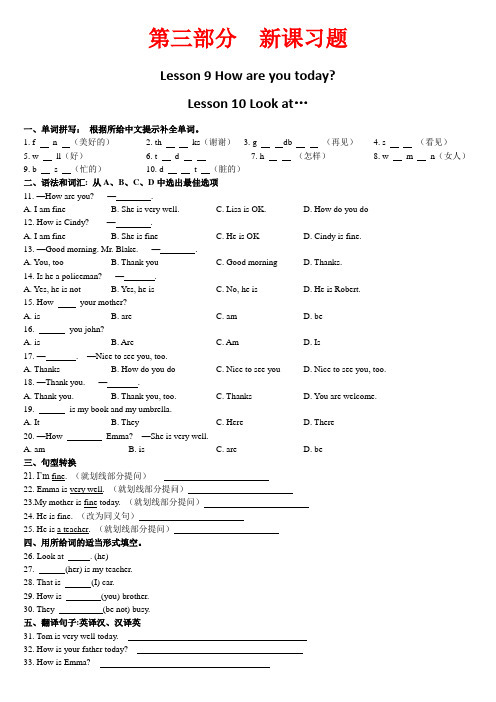新概念第一册lesson9-10
新概念英语第一册 Lesson9-10 How are you today?

review
• • • • • • • • • • 1 policeman 2 policewoman 3 taxi driver 4 air hostess 5 postman 6 nurse 7 mechanic 8 hairdresser 9 housewife 10 milkman n.警察 n.女警察 出租汽车司机 空中小姐 n.邮递员 n.护士 n.机械师 n.理发师 n.家庭妇女 n.送牛奶的人
cold [kəuld] 冷的
hot dog 热狗
I’m very hot. 我很热。 I’m very cold. 我很冷。 It is very hot. 天很热。 It’s very cold. 天很冷。
young [jʌŋ] 年轻的
old [əuld] 年老的,旧的
new [nju:] 新的
1.用于朋友或相识的人之间的寒暄话
本课知识点
代词
代词的定义:
代词是一种能代 替名词、形容词 或数词的词。
代词分类
Which kind of pronouns is it?
人称代词 (Personal Pronouns) 物主代词 (Possessive Pronoun) 反身代词 (Reflexive Pronouns) 指示代词 (Demonstrative Pronouns)
review
• 1.What's your name? • What's his/her name? • 回答:My/His/Her name is.... • 2.What nationality are you? • 回答:I'm+国籍 • 3.What's your job? • 回答:Iபைடு நூலகம்m+职业
新概念英语第一册Lesson910Howareyoutoday小学英语全国通用

Language Point
语句讲解、课文讲解
Steven (hot) Look at Steven! He's hot
Emma (cold) Look at Emma! She's cold.
Language Point
语句讲解、课文讲解
That milkman (old) Look at that milkman! He's old.
man的反义词。
Language Point
语句讲解、课文讲解
Look at that policeman! He's tall. Look at that policewoman! She's short. policeman : 男性警察 policewoman : 女性警察 tall : 长的 , 高的 short : 短的 , 矮的
查看答案解析
答案:policewoman 解析: 考查词义 policewoman n. 女警察;女警官;
语句讲解、课文讲解
同学们 , 请对照教材听老师讲解!
How are you today?
同学们 , 请做一下课堂笔记。
Language Point
语句讲解、课文讲解
how : 疑问副词,怎么样 what : 什么 e.g. What is your name? 你叫什么名字? —How are you? —I'm fine, thank you. / Fine, thank you.
Emma is very well. 艾玛很好。
Vocabulary
词汇精讲
today
adv. 今天
o : 不发 [o] 而发 [ə] 做副词 , 表示今天 e.g. I am late today. 我今天迟到了。 today作副词时 , 句中位置灵活 Today I am late. > I 始终大写
新概念英语第一册第9-10课课件

B: Not so good . 不是很好。
Not bad.
一般般。
Pretty good. 挺好的。
Great.
非常好。
Couldn’t be better. 再好不过了。
How is Tony? He is fine .
How are you? I’m well. I am well.
A How are you How is he ?
怎样 今天 身体好 美好的 再见 看见,见到
New words
h_ow t_oday w_ell f_i ne g_o o_dby_e s_e _e
怎样 今天 身体好 美好的 再见 见
Listening and answer
How is Emma? She’s very well.
:
Steven: Hello, Helen. Helen: Hi, Steven.
C. That’s all right
A. am
B. is
C. are
二、改写句子。 下面的句子是一组对话,但是顺序被打乱了。请你
C. yours
A. Look
B. Look at
C. See
C ( ) 6. Please ___ the picture.
AA. look
B. look at
( ) 7. I can’t ___ the book.
C. see
A. see
B. read
B( ) 8. I want to ___ the film.
Nice to see you , too ,
Steven .Goodbye .
= See you later.=See you. =See you around.
新概念英语第一册Lesson9-10Howareyoutoday(课件)(1)

• hot /hot/ adj.热的 • cold /ksold/ adj.冷的 • old /auld/ adj,老的 • young /jAt)/ adj.年轻的 • busy /'bizi/ 忙的 • lazy /'leizi/ adj.懒的 • She is busy. • He is lazy boy他是一个很懒惰的男孩
• 史蒂文:她也很好,海伦。 • 史蒂文:再见,海伦。见到你真高兴。 • 海 伦:我见到你也很高兴,史蒂文。再见。
• 1How are you
• 这是朋友或相识的人之间见面时问对方身体情况的寒暄话, 一般回答是:Fine, thank you.
• 2And you 即 And how are you 的简略说法 o
Reading
• 史蒂文:你好,海伦。 . • 海伦:你好,史蒂文。 • 史蒂文:你今天好吗? • 海伦:很好,谢谢你。你好吗?
• STEVEN : How is Tony
• HELEN : He's fine, thanks.How's Emma
• 史蒂文:托尼好吗
'
• 海伦:他很好,谢谢。埃玛好吗?
• 3Nice to see you.是 It*s nice to see you.的简略说 法。
• 这一句也是见面时的客气话:一般回答是:Nice to see you, too.见到你,我也很高兴。也可说: Nice to meet you.很高兴遇到你。Thank you for
your watching
• see /si:/ v.见 • Did you see her • I see many stars in the sky. • see-saw过去式 • look for寻找 • find找到
新概念英语第一册第9课课件

Sophia
Words and expressions
fat
thin
tall short
clean
dirty
hot
cold
olExercise
Listen and tell the number of the word. 1fat 2thin 3tall 4short 5dirty 6.clean 7.hot 8.cold 9.old 10.young 11.busy
T:How……? S:How is Steven?
THANKS!
数
Comprehension
T:What’s her name?
S:Helen T:How is Helen?
S:She is very well.
Asking and answering questions
1 T: Ask me if Steven is well today. S:Is Steven well today?
zy 13.see 14.Well 15.How 16fine 17goodbye 18today 19hello 20thanks
A story about greeting…
Story time
Watch the video and answer:
How is Emma?
Listening and imitation
二、Greetings. Hello ! Hi ! Good morning ! Good evening !
Good afternoon !
How are you ?
How do you do !
Nice to meet you ! Glad to meet you !
新概念英语第一册lesson9-10

Steven:Goodbye, Helen. Nice to see you.
Helen:Nice to see you, too, Steven. Goodbye.
• Nice to see you!-见到你很高兴!
见到你真高兴。 用于第二次见面或朋友之间 回答也是Nice to see you!
• 罗伯特:我是新来的学生,我的名字叫罗伯特。 • 索菲亚:很高兴见到你。我的名字叫索菲亚。 • 罗伯特:你是法国人吗? • 索菲亚:是的,我是法国人。 • 索菲亚:你也是法国人吗? • 罗伯特:不,我不是。 • 索菲亚:你是哪国人? • 罗伯特:我是意大利人。 • 罗伯特:你是老师吗? • 索菲亚:不,我不是。 • 罗伯特:你是做什么工作的? • 索菲亚:我是电脑录入员。 • 索菲亚:你是做什么工作的? • 罗伯特:我是工程师。
young/j∧ŋ/ adj. 年轻的
old /əud/ adj. 年老的
busy /'bizi/ adj. 忙碌的 a busy day忙碌的一天
lazy /'leizi/ adj. 懒的 Mary is very lazy.
• Look at… She\He\It is + adj .
• She isn’t …,She is …
fat /fæ t/ adj.胖的 short /ʃɔ:t/ adj.矮 的
['wumən] 女人
women /'wimin/
[mæ n] 男人
men /men/
/lɒŋ/ 长的 / ʃɔ:t / 短的
thin [θin] 瘦的 tall /t :l/ 高的
新概念英语第一册Lesson 9&10

Key Points:
adj. 身体好的;健康的 adv. 好地;满意地;彻底地;充分地 int. (表示惊讶、同意)嗯;哎; e.g.: 他考试成绩很好。 He did very well in the exam. e.g.: 我和她不熟。 I don't know her well. e.g.: 医生说你过几天就会恢复健康。 The doctor says you will be well again in a few days. e.g.: Well, what a surprise! • well
woman [‘wumən] 女人
man [mæ n] 男人
pig [pig] 猪
fat [fæ t] 胖的
am [æ m] be动词,是 it [it] 它
he [hi:] 他
she [ʃi:] 她
is [iz] be动词,是
thin [θin] 瘦的
rabbit ['ræ bit] 兔子
• • • • • • • • • • 史蒂文:你好,海伦 海 伦:你好,史蒂文 史蒂文:你今天好吗? 海 伦:很好,谢谢你。你好吗? 史蒂文:很好,谢谢。 史蒂文:托尼好吗? 海 伦:他很好,谢谢。埃玛好吗? 史蒂文:她也很好,海伦。 史蒂文:再见,海伦。见到你真高兴。 海 伦:我见到你也很高兴,史蒂文。再见。
Key Points:
→ how soon (多长时间)以后;多快 e.g.: --- 飞机还有多久起飞? --- 20分钟后。 How soon will the plane take off? --- In 20 minutes. → how many (much) (数量)多少 → how about (doing sth.) (做某事)如何 e.g.: 这个周末购物怎么样? How about shopping this weekend? → how much (价格)多少 → how often (频率)多少 e.g.: How often do you brush your teeth? --- Twice a day.
新概念第一册Lesson 9~10习题

第三部分新课习题Lesson 9 How are you today?Lesson 10 Look at…一、单词拼写:根据所给中文提示补全单词。
1. f n (美好的)2. th ks(谢谢)3. g db (再见)4. s (看见)5. w ll(好)6. t d7. h (怎样)8. w m n(女人)9. b s (忙的)10. d t (脏的)二、语法和词汇: 从A、B、C、D中选出最佳选项11. —How are you? —.A. I am fineB. She is very well.C. Lisa is OK.D. How do you do12. How is Cindy? —.A. I am fineB. She is fineC. He is OKD. Cindy is fine.13. —Good morning. Mr. Blake. —.A. You, tooB. Thank youC. Good morningD. Thanks.14. Is he a policeman? —.A. Yes, he is notB. Yes, he isC. No, he isD. He is Robert.15. How your mother?A. isB. areC. amD. be16. you john?A. isB. AreC. AmD. Is17. —. —Nice to see you, too.A. ThanksB. How do you doC. Nice to see youD. Nice to see you, too.18. —Thank you. —.A. Thank you.B. Thank you, too.C. ThanksD. You are welcome.19. is my book and my umbrella.A. ItB. TheyC. HereD. There20. —How Emma? —She is very well.A. amB. isC. areD. be三、句型转换21. I’m fine. (就划线部分提问)22. Emma is very well. (就划线部分提问)23.My mother is fine today. (就划线部分提问)24. He is fine. (改为同义句)25. He is a teacher. (就划线部分提问)四、用所给词的适当形式填空。
- 1、下载文档前请自行甄别文档内容的完整性,平台不提供额外的编辑、内容补充、找答案等附加服务。
- 2、"仅部分预览"的文档,不可在线预览部分如存在完整性等问题,可反馈申请退款(可完整预览的文档不适用该条件!)。
- 3、如文档侵犯您的权益,请联系客服反馈,我们会尽快为您处理(人工客服工作时间:9:00-18:30)。
The rabbit is very busy.
The young man is very lazy.
busy ['bizi] 忙的
lazy ['leizi] 懒的
※注意:look at … 看…, 它主要是强调看的对象,所以 “at”不能丢哦!
Look at that man. He is fat.
New words and expressions
hello hi how today well
fine thanks goodbye see
词汇
today 今天 tomorrow 明天 yesterday 昨天 the day after tomorrow 后天 the day before yesterday 前天
疑问代词 (Interrogative Pronouns)
相互代词 (Reciprocal Pronouns)
不定代词 (Indefinite Pronouns)
(1) 人称代词
口诀1: 主格和宾格的用法
主语上主格, 动介后宾格.
口诀2: 并列人称代词的排列顺序
单数人代二三一, 复数人代一二三; 两性并列男在前, 承认错误我当先;
词汇
see v.看见
近义词: look (at) v.看……(强调动作) watch v. 盯着看 read v. 看书,看报
Notes on the text 课文注释
一. Listen to the tape, and then fill in the blanks:
Hello ,Helen .
它的回答是: Nice to see you,too.
Grammar in use 语法点
代词
代词的定义:
代词是一种能代 替名词、形容词 或数词的词。
代词分类
Which kind of pronouns is it?
人称代词 (Personal Pronouns) 物主代词 (Possessive Pronoun) 反身代词 (Reflexive Pronouns) 指示代词 (Demonstrative Pronouns)
Good evening !
Nice to see you !
Nice to meet you ! Glad to meet you !
Good bye ! Bye !
Bye-bye !
See you !
How are you? 这是朋友或相识的人之间见面时问对方身体情况的寒暄 话,一般回答是: Fine,thank you.
一.人称代词
单数 格 人称 主格 宾格 第一人称 I me 第二人称 you you he him 第三人称 she her it it
数
复数 主格 宾格 we us you you
they them
Chant :
主格代词顺口溜: 我是I ,你是You ; 男他He ,女她She ,动物的它是It; 我们We ,你们You ,他们They. Who are you ?
词汇
well
a.好的 n. 井
fine a. 美好的 (天气,身体) good a. 好的
词汇
感谢的说法: Thanks 谢谢 Thank you. Thank you very much! 非常感谢
词汇
Goodbye 再见 老外在说: See you later. See you after. See you. ---- See ya. Later. 特殊场合:有时候说一会见不太好,我们用: Have a nice day!
Goodbye ,Helen . Nice to see you . Nice to see you , too ,
Steven .Goodbye .
二. Greetings (问候,打招呼)
Hello !
Hi !
Good morning !
Good afternoon !
How are you ?
Look at the girl. She is lazy.
The end
I’m fine/ great, thanks.
I’m very well, thanks. 如果是很熟悉的朋友,大家也可以回答,Not bad。 当然,因为这属于寒暄语,所以我们就算心情很 差,一般也不会直接的就说bad. 除非是极要好的朋 友,你需要聊天和倾诉,也可以说Not good, 朋友 会追问why?,这样就产生出更多的对话。
cold [kəuld] 冷的
hot dog 热狗
I’m very hot. 我很热。 I’m very cold. 我很冷。 It is very hot. 天很热。 It’s very cold. 天很冷。
young [jʌŋ] 年轻的
old [əuld] 年老的,旧的
new [nju:] 新的 photo ['fəutəu] 相片 a young man 一位年轻男士 an old man 一位年老的男人 an old photo 一张旧照片 a new photo 一张新照片
Mr. Cheng Miss. Xu
woman [‘wumən] 女人
man [mæ n] 男人
pig [pig] 猪
fat [fæ t] 胖的
am [æ m] be动词,是 it [it] 它
he [hi:] 他
she [ʃi:] 她
is [iz] be动词,是
thin [θin] 瘦的
Where do you come from?
What nationality is she?
Where is she from?
What’s her y?
What nationality is he?
Where is he from?
What’s his nationality?
• 事情进展如何? How is it going?=How goes it? • 生活如何? How's life? 工作怎样? How's work? 情况怎样? How are things?
And you? 它的完整表达是:
And how are you?
Nice to see you.
rabbit ['ræ bit] 兔子
tall [tɔ:l] 高的 short [ʃɔ:t] 矮的 long [lɔŋ] 长的 翻译练习: 这把尺很长。This ruler is long. 那个男人很高。This man is tall. 那把尺很短。That ruler is short. 这个女人很瘦。This woman is thin.
Hi ,Steven .
How are you today ? I’m very well ,thank you .
And you ? I’m fine .Thanks.
How is Tony? He is fine .
How is Emma ? She is very well ,too.
clean [kli:n] 干净的
dirty [‘də:ti] 脏的
The coat is clean. 这件大衣很干净。
The dress is dirty. 那件连衣裙很脏。
the [ðə] 定冠词,这,那
a/an 不定冠词,一
a coat 一件大衣 a dress 一件连衣裙
hot [hɔt] 热的
Lesson 9 How are you today ?
What’s your name?
What’s his name?
What’s her name?
询问国籍
What nationality are you?
=
What’s your nationality?
= =
Where are you from?
